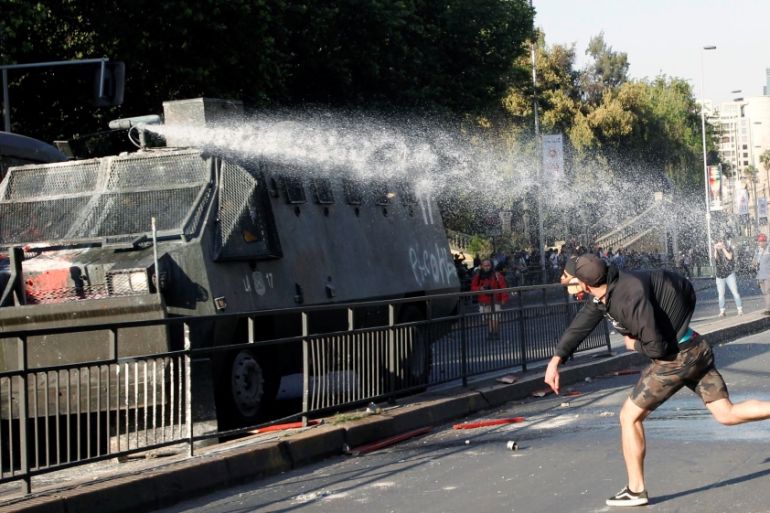Chile protests: State of emergency declared in Santiago
Government deploys military in the capital as protests against increase in subway ticket prices descended into violence.

Chile’s president has declared a state of emergency in the capital Santiago, giving the military responsibility for security after a day of violent protests over an increase in the price of metro rapid transit system tickets.
“I have declared a state of emergency and, to that end, I have appointed Major General Javier Iturriaga del Campo as head of national defence, in accordance with the provisions of our state of emergency legislation,” President Sebastian Pinera said on Friday night.
Throughout Friday, protesters clashed with riot police in several parts of the city and the subway system was shut after attacks on several stations.
Enel Chile, a subsidiary of Italian utility Enel, said vandals had set fire to the company’s high-rise corporate headquarters in the city centre.
Local television footage showed flames climbing up the side of the building as firefighters struggled to break through growing crowds of protesters.
“In the coming days, our government will call for a dialogue … to alleviate the suffering of those affected by the increase in fares,” Pinera said in the broadcast address.
Metro ticket price rise
On Thursday, 133 people had been arrested for causing damage to metro stations, estimated at up to 500 million pesos ($703,500).

The unrest started as a fare-dodging protest against the increase in metro ticket prices, which increased from 800 pesos to 830 pesos ($1.13 to $1.17) for peak hour travel, following a 20-peso rise in January.
Attacks on metro stations forced the closure of the entire subway system, which is the key form of public transport in the congested capital, carrying three million passengers a day.
“The entire network is closed due to riots and destruction that prevent the minimum security conditions for passengers and workers,” the metro operator said on Twitter, after attacks against nearly all the 164 stations where many gates and turnstiles were destroyed.
|
|
The Santiago Metro, at 140km (90 miles), is the largest and most modern in South America, and is expected to remain closed this weekend and could reopen gradually next week.
Closure of the metro forced many Santiago residents to walk home, sometimes long distances, resulting in scenes of chaos.
protesters erected barricades in various parts of the city and clashed with police, who used water cannon and tear gas in the most violent street battle seen in the Chilean capital in a long time.
Pinera slammed the protesters as criminals.
“This desire to break everything is not a protest, it’s criminal,” he said in a radio interview.
Earlier on Friday, after a meeting with the metro chief and interior minister, Transport Minister Gloria Hutt told reporters the fare increase would not be reversed.
She said the government subsidises almost half the operating costs of the metro. “This is not a discussion that should have risen to the level of violence that we’ve seen,” she said.